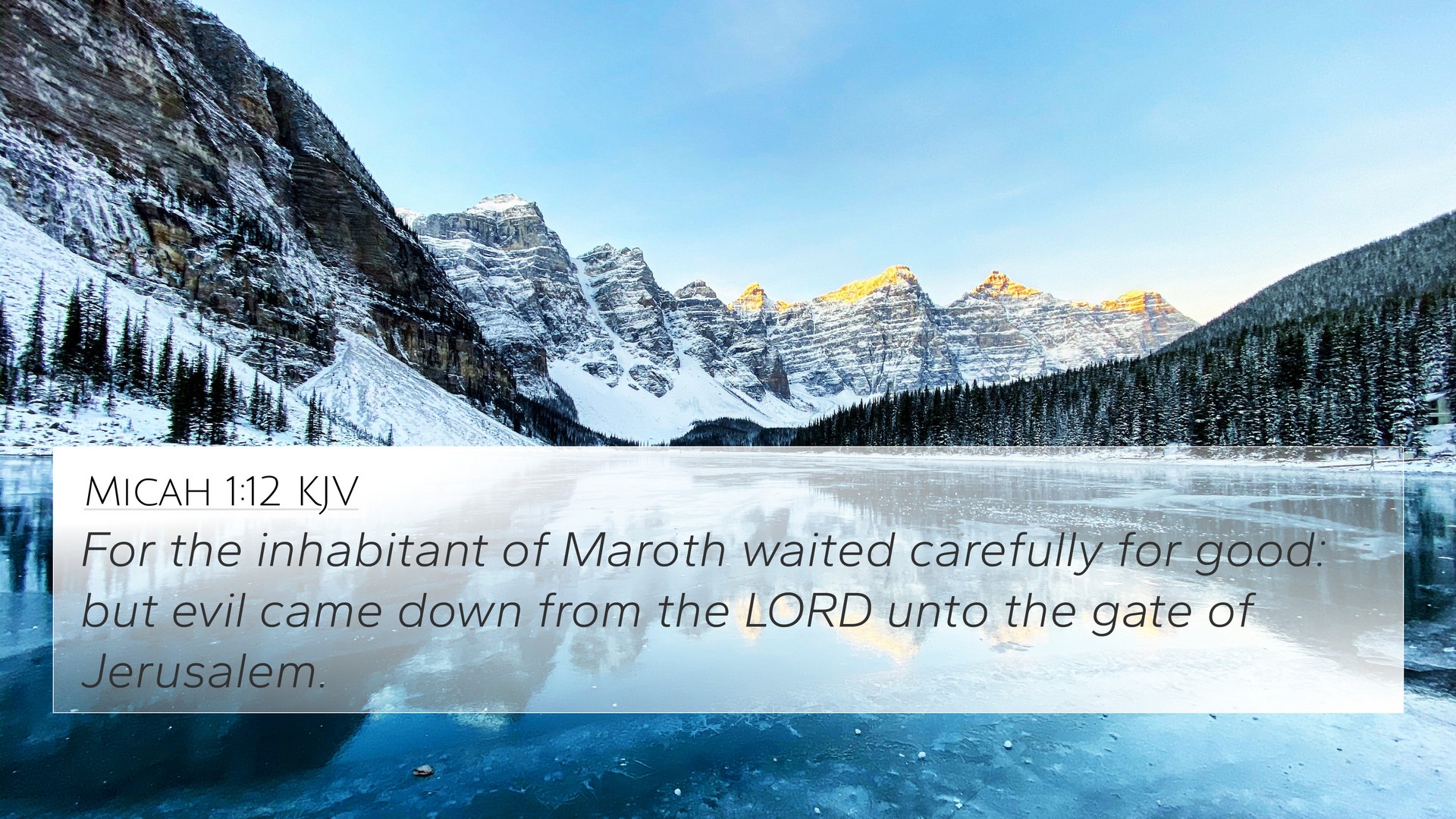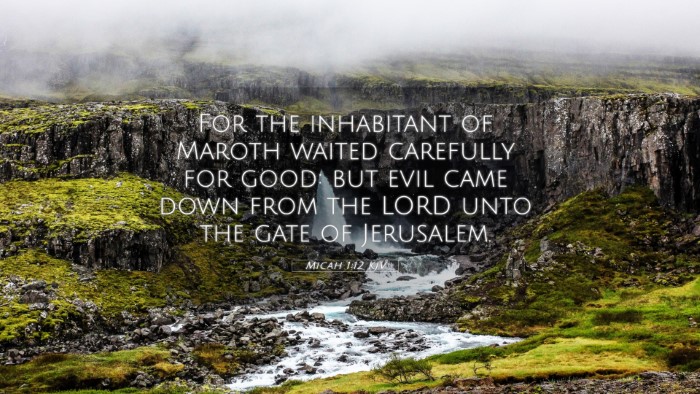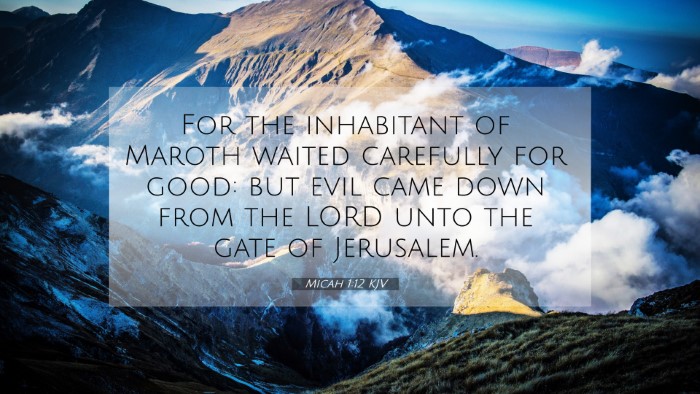Old Testament
Genesis Exodus Leviticus Numbers Deuteronomy Joshua Judges Ruth 1 Samuel 2 Samuel 1 Kings 2 Kings 1 Chronicles 2 Chronicles Ezra Nehemiah Esther Job Psalms Proverbs Ecclesiastes Song of Solomon Isaiah Jeremiah Lamentations Ezekiel Daniel Hosea Joel Amos Obadiah Jonah Micah Nahum Habakkuk Zephaniah Haggai Zechariah MalachiMicah 1:12 Similar Verses
Micah 1:12 Cross References
For the inhabitant of Maroth waited carefully for good: but evil came down from the LORD unto the gate of Jerusalem.
Uncover the Rich Themes and Topics of This Bible Verse
Listed below are the Bible themes associated with Micah 1:12. We invite you to explore each theme to gain deeper insights into the Scriptures.
Micah 1:12 Cross Reference Verses
This section features a detailed cross-reference designed to enrich your understanding of the Scriptures. Below, you will find carefully selected verses that echo the themes and teachings related to Micah 1:12 KJV. Click on any image to explore detailed analyses of related Bible verses and uncover deeper theological insights.
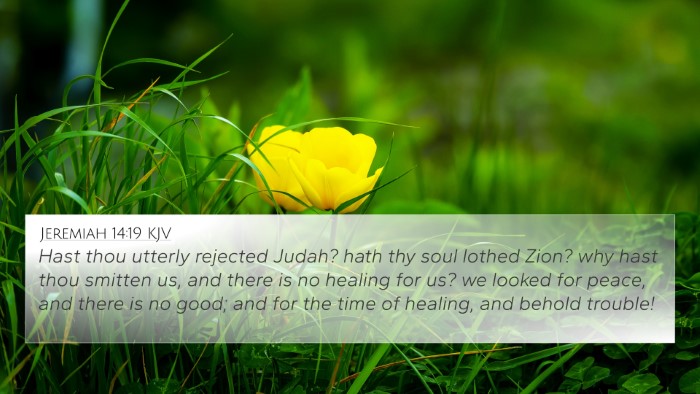
Jeremiah 14:19 (KJV) »
Hast thou utterly rejected Judah? hath thy soul lothed Zion? why hast thou smitten us, and there is no healing for us? we looked for peace, and there is no good; and for the time of healing, and behold trouble!
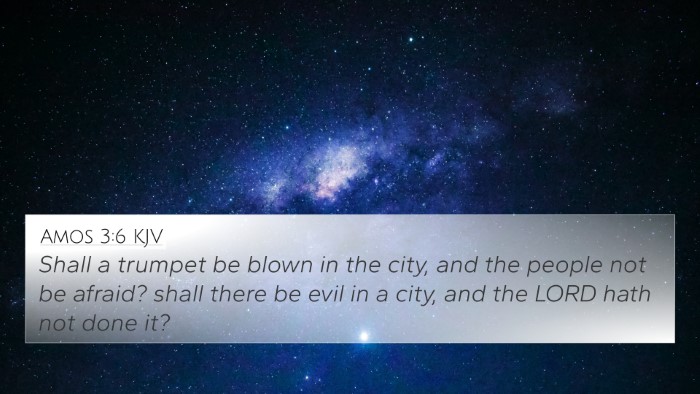
Amos 3:6 (KJV) »
Shall a trumpet be blown in the city, and the people not be afraid? shall there be evil in a city, and the LORD hath not done it?
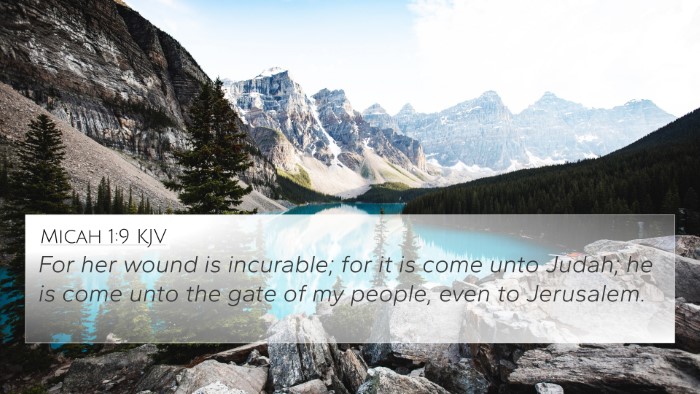
Micah 1:9 (KJV) »
For her wound is incurable; for it is come unto Judah; he is come unto the gate of my people, even to Jerusalem.
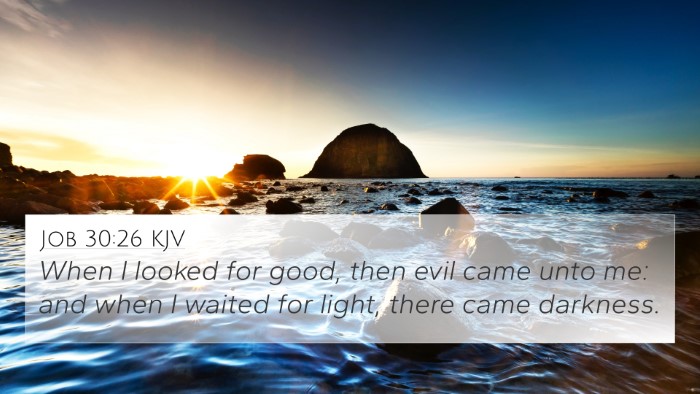
Job 30:26 (KJV) »
When I looked for good, then evil came unto me: and when I waited for light, there came darkness.
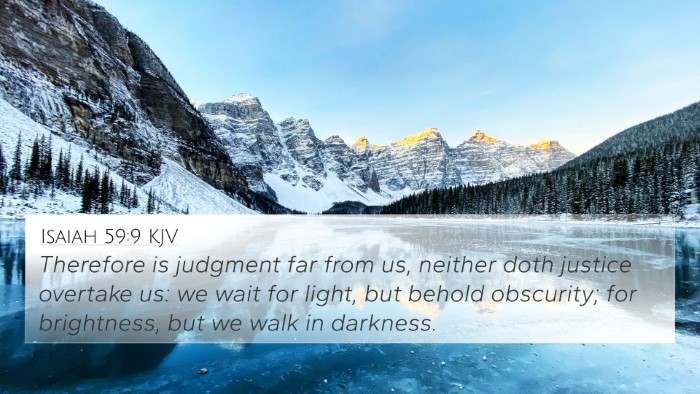
Isaiah 59:9 (KJV) »
Therefore is judgment far from us, neither doth justice overtake us: we wait for light, but behold obscurity; for brightness, but we walk in darkness.

Isaiah 45:7 (KJV) »
I form the light, and create darkness: I make peace, and create evil: I the LORD do all these things.
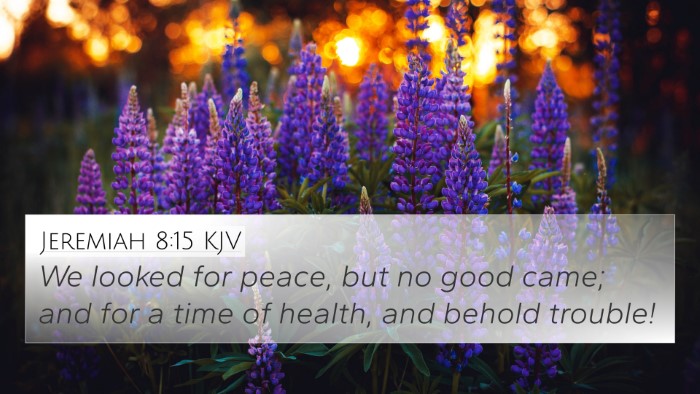
Jeremiah 8:15 (KJV) »
We looked for peace, but no good came; and for a time of health, and behold trouble!

Ruth 1:20 (KJV) »
And she said unto them, Call me not Naomi, call me Mara: for the Almighty hath dealt very bitterly with me.
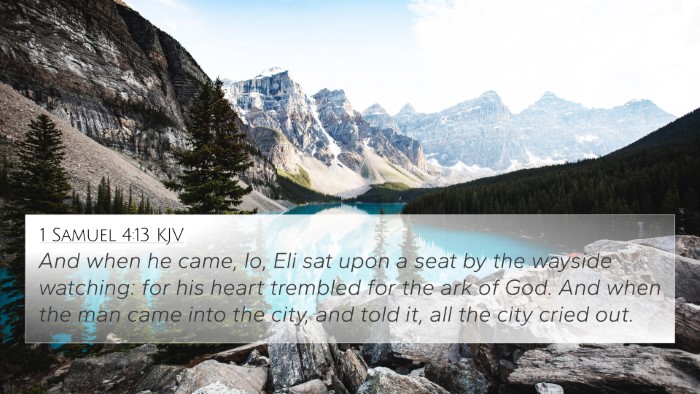
1 Samuel 4:13 (KJV) »
And when he came, lo, Eli sat upon a seat by the wayside watching: for his heart trembled for the ark of God. And when the man came into the city, and told it, all the city cried out.
Micah 1:12 Verse Analysis and Similar Verses
Understanding Micah 1:12
Micah 1:12 states:
"For the inhabitant of Maroth waited carefully for good: but evil came down from the LORD unto the gate of Jerusalem."
This verse reveals profound themes of expectation, disappointment, and divine judgment. In this analysis, we draw insights from notable public domain commentaries, focusing on how this verse connects both contextually and thematically with other Scriptures.
Verse Summary
Micah, a prophet in the Old Testament, articulates the turmoil within the nation of Judah as they face impending judgment. Maroth, representing a location whose name means "bitter," symbolizes the bitterness of the people who awaited good but were met with evil instead. This underscores God’s sovereignty in delivering both justice and mercy.
Contextual Background
Micah prophesies during a period of moral decay and corruption in Israel, critiquing the leaders and wealthy for their exploitation of the poor. His message begins with warnings of judgment intertwined with a promise of future restoration.
Insights from Commentaries
- Matthew Henry: Henry emphasizes the sorrow of the people of Maroth, who expected divine favor but were instead faced with calamity. This reflects the broader principle of God's dealings with His people—much can be anticipated in faith, yet reality may present trials.
- Albert Barnes: Barnes discusses the nature of waiting for good and the unexpected arrival of evil. He points out that this illustrates the theme of human longing for relief amidst suffering and highlights the complex character of God’s providence.
- Adam Clarke: Clarke explains the geographical significance of Maroth. He connects this locality’s fate to the broader defeat experienced by Jerusalem, which serves as a reminder of national sin leading to corporate consequence.
Key Themes
- Divine Sovereignty: The verse indicates that ultimate control rests with God, who decides the outcomes based on righteousness.
- Human Expectation: It illustrates the contrast between human desire and divine action, questioning what it means to hope in unfavorable situations.
- Judgment and Mercy: This duality is prevalent throughout the Scripture, where God’s justice is manifested even amidst His love and compassion.
Bible Verse Cross-References
- Jeremiah 14:19-22: Discusses the agony of pleas for mercy amidst judgment.
- Lamentations 3:25-26: Emphasizes the goodness of waiting on the Lord in times of trouble.
- Isaiah 5:20: Woe to those who call evil good and good evil, relating to the false hopes of the people.
- Psalms 107:12-14: Offers insight into the cycles of suffering and redemption, aligning with the plight depicted in Micah.
- Amos 5:18: Cautions against longing for the day of the Lord while neglecting justice and righteousness.
- Romans 8:28: Provides a New Testament perspective on how all things work together for good for those who are called by God.
- James 1:2-4: Encouragement to understand the value of trials and waiting periods in faith.
Thematic Connections Between Bible Verses
In exploring the meanings of Micah 1:12, we can observe numerous connections with other Scripture texts:
- Both Jeremiah 14:19-22 and Micah 1:12 delve into the tension between expectation of goodness and the reality of impending judgment.
- In Isaiah 5:20, the warning against corrupt expectations parallels the disillusionment expressed in Micah.
- Lamentations similarly reflects the deep sorrow and longing for God’s mercy amid despair.
- Romans 8:28 and James 1:2-4 introduce a New Testament understanding of how waiting upon the Lord produces endurance and ultimately leads to good.
Conclusion
In conclusion, Micah 1:12 serves as a profound reminder of the complexities of faith, divine sovereignty, and human expectations. Through the lens of various commentaries, the verse reveals its layers of meaning while establishing connections with a number of other critical Biblical texts. The exercise of inter-Biblical dialogue strengthens our understanding and enriches our Bible study experiences, enhancing our ability to draw cross-references that illuminate scriptural truths.
